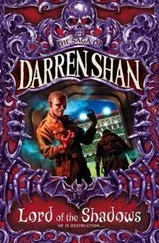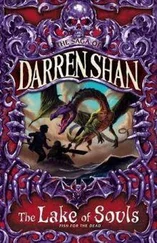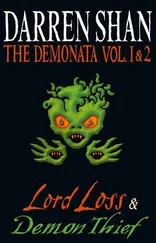Darren Shan - Lord Loss
Здесь есть возможность читать онлайн «Darren Shan - Lord Loss» — ознакомительный отрывок электронной книги совершенно бесплатно, а после прочтения отрывка купить полную версию. В некоторых случаях можно слушать аудио, скачать через торрент в формате fb2 и присутствует краткое содержание. Жанр: Ужасы и Мистика, Фэнтези, на английском языке. Описание произведения, (предисловие) а так же отзывы посетителей доступны на портале библиотеки ЛибКат.
- Название:Lord Loss
- Автор:
- Жанр:
- Год:неизвестен
- ISBN:нет данных
- Рейтинг книги:4 / 5. Голосов: 1
-
Избранное:Добавить в избранное
- Отзывы:
-
Ваша оценка:
- 80
- 1
- 2
- 3
- 4
- 5
Lord Loss: краткое содержание, описание и аннотация
Предлагаем к чтению аннотацию, описание, краткое содержание или предисловие (зависит от того, что написал сам автор книги «Lord Loss»). Если вы не нашли необходимую информацию о книге — напишите в комментариях, мы постараемся отыскать её.
Lord Loss — читать онлайн ознакомительный отрывок
Ниже представлен текст книги, разбитый по страницам. Система сохранения места последней прочитанной страницы, позволяет с удобством читать онлайн бесплатно книгу «Lord Loss», без необходимости каждый раз заново искать на чём Вы остановились. Поставьте закладку, и сможете в любой момент перейти на страницу, на которой закончили чтение.
Интервал:
Закладка:
I look for my picture but I’m not among them. Dad and Gret are though, in new frames. Recent photos. I remember the day they were taken, last summer, when we were on holiday in Italy.
No photo of Mum. I go through them all again, but she isn’t here. The two of us are missing.
Shopping for clothes, twenty miles from Carcery Vale, in a large mall. Lots of people and noise. I feel lost in the crowd. Dervish sticks close by me, sensing my nervousness.
Kebabs when we’ve finished shopping. Hot and juicy. Dervish nibbles slowly at his, delicately. I finish long before him. Slurping down the last of my Coke. Studying him as he eats. Wondering if I should mention Mum’s and my absence from the hall of portraits.
“An unasked question is the most futile thing in the world,” Dervish says, startling me. Doesn’t look up. Swallows his food. Waits.
“I was looking at the photos and portraits in the hall today,” I begin.
“And you want to know why there are so many teenagers.”
I frown. “No. I mean, I noticed that, but it was Mum and me I was curious about. You have photos of Dad and Gret, but not us.”
“Oh.” He grimaces. “My faux pas. Most people ask about the teens. The photos and portraits are all of dead family members. I like to frame them as they looked at the end of their lives, so most of the photos were taken shortly before the subject’s death. We have a tragic family history—lots of us have been killed young—which is why there are so many pubescents up there.”
He wipes around his mouth with a napkin, carefully balls it up and lays it aside. “As for why Sharon hasn’t been included, it’s simple—no in-laws. Everybody on those walls is a blood relative. It’s a family tradition. But I’ve lots of photos of her, as well as Cal and Gret, in albums that you’re free to browse through.”
“Maybe later,” I smile. “I just wanted to make sure you didn’t have any underhand reasons for not including us with the others.”
“Everything’s above board with me, Grubbs,” Dervish says, then sips from his mug of coffee without taking his eyes off me. “Well—almost everything.”
Late. Close to midnight. In my pyjamas. No slippers—I left my old pair at the hospital and I forgot to buy new ones today. The stone floor’s cold. I have to keep moving my toes to keep them warm.
I’m drawn back to the hall of portraits. Studying them in moonlight, the faces mostly concealed by shadows. Focusing on the teenagers. Dozens of them, all my age or slightly older. Wondering why the faces of the dead teens fascinate me, and why I feel uneasy.
I’m back in my room, in bed, before the answer strikes and drives all hope of sleep away in a flash. In the restaurant, Dervish didn’t simply say that many of our family members had died young—he said they’d been killed.
SPLEEN
Settling in. Daily chores—washing-up after meals, sweeping a different couple of floors each day, polishing the furniture in one of the large halls or rooms. Lots of other, less regular jobs—taking out the garbage, cleaning windows, running errands in the village.
I enjoy the work. It keeps me busy. Not much else to do here apart from play chess with Dervish, watch TV—Dervish has a massive 55 inch widescreen set, which he hardly ever uses!—and read. Chess doesn’t thrill me—Dervish is like Mum and Dad, a chess fanatic, and beats me easily each time we play. I’d as soon not play at all, but he gently presses me to work on my game. I don’t get my family’s obsession with chess, but I guess I’ll just have to bear it here like I did at home.
I read more than I normally do—I’m not big on ‘litrachoor’—but Dervish doesn’t have a great collection of modern fiction. I pick up a few new books in the Vale, and order some more over the Internet, but I’m not spoilt for choice. I try some of the thousands of occult books littering the shelves, figuring they’ve got to be better than watching the moon all night, but they’re too complicated or densely written to be of interest.
So that leaves me with the TV—an endless stream of soap operas, chat shows, movies, sitcoms, sports programmes. And while I never thought I’d admit such a thing, TV does get a bit boring after a while, if it’s all you have to keep yourself amused.
But, hey, it’s a million times better than the institute!
A week passes. At ease with the house. Getting to know Dervish, though he’s a hard one to figure. Kind, thoughtful, caring—but aloof, with a warped sense of humour. He came in one day while I was watching the news. Caught a report about a serial killer who’d chopped off and collected his victims’ heads. Commented drily, “There’s a man determined to get ahead in life.” Spent the next five minutes doubled over with laughter, while I gazed at him, astonished, and the TV broadcast pictures of bloodbaths and weeping relatives.
His thirst for chess is at least equal to that of Dad and Mum, if not more so. He went easy on me to begin with, gently encouraging me to play, treating the games as fun. Now he’s showing his true colours. Insists that I play with him every night and gets irritated when I play badly.
“You’ve got to love the game,” he told me last night, tossing a captured rook at me with unexpected force. “Chess is life. You have to love it as you love living. If you don’t…”
He said no more, just stormed out of the room, leaving me at a loss for words, rubbing my cheek where the rook struck. Later, when I’d recovered and was passing him in the hall on my way to bed, I muttered, “Get a life, you freak!” The perfect comeback—just an hour too late.
He’s got no time for music. I find a grand total of three CDs in the house, all old albums by some group called Led Zeppelin. Doesn’t read fiction. Watches only the occasional documentary on TV. Spends a lot of time on the web, from what I’ve seen when I’ve visited him in his study. But he doesn’t seem to surf or play games—he mostly exchanges e-mails with contacts around the globe, or visits dull-looking encyclopaedic sites.
Apart from his books and antiques, chess and jogging, and his e-mail mates, he doesn’t seem to have any hobbies, or any apparent interest in the world beyond this house.
There are stables—long abandoned—behind the mansion. I’m exploring one of them, idly toeing through the old nails and horseshoes on the ground in search of some interesting nugget, when somebody raps on the rotten door and startles me out of my skin.
“Peace, hombre,” the stranger chuckles as I duck and grab a horseshoe for protection. “I come to greet you, not to eat you—as the cannibal said to the missionary.”
A boy a year or so younger than me enters and sticks out his hand. I stare at it a moment, then shake it. He’s a lot shorter than me, chubby, with black hair and a lazy left eye which hangs half-closed. Wearing a faded pair of jeans and an old Simpsons T-shirt.
“Bill-E Spleen,” he says, pumping my hand. “And you’re Grubbs ‘don’t call me Grubitsch!’ Grady, right?”
“Right,” I grin thinly, then repeat his name. “Billy Spleen?”
“Bill-E,” he corrects me, and spells it out. “Actually, it’s really Billy,” he confesses, “but I changed it. I haven’t been able to do it by deed poll yet, but I will when I’m older. There’s nothing wrong with Billy—it’s a hell of a lot better than Grubitsch or Grubbs!—but Bill-E sounds cooler, like a rap star.”
He talks quick and sharp, fingers dancing in the air to accent his words.
“Are you from the village?” I ask politely.
“Yup—I’m a Valer,” he yawns, as though it’s the dullest thing in the world. “I used to live a few miles over—in a cottage smaller than this stable—until Mum died. Then I moved in with my grandparents—‘the original Spleens,’ as Mum used to call them. They’re OK, just a bit old-fashioned and strait-laced.”
Читать дальшеИнтервал:
Закладка:
Похожие книги на «Lord Loss»
Представляем Вашему вниманию похожие книги на «Lord Loss» списком для выбора. Мы отобрали схожую по названию и смыслу литературу в надежде предоставить читателям больше вариантов отыскать новые, интересные, ещё непрочитанные произведения.
Обсуждение, отзывы о книге «Lord Loss» и просто собственные мнения читателей. Оставьте ваши комментарии, напишите, что Вы думаете о произведении, его смысле или главных героях. Укажите что конкретно понравилось, а что нет, и почему Вы так считаете.



